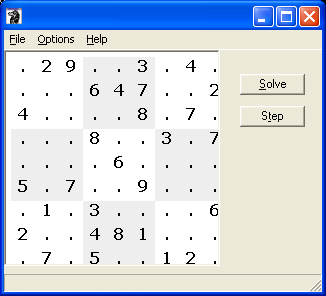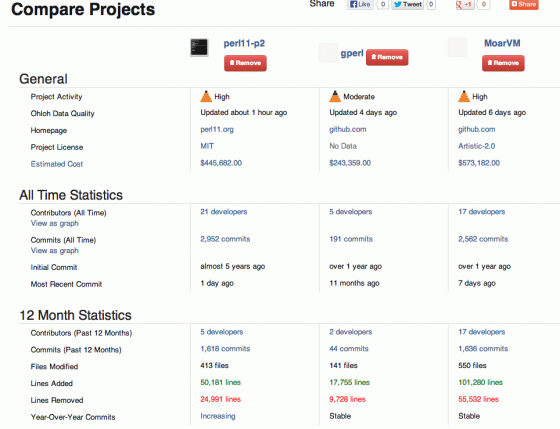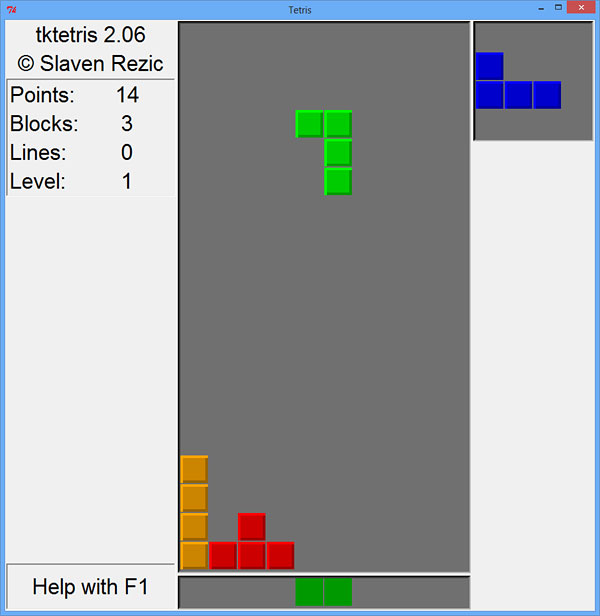I translated "Debugger Manual" to English
I translated "Debugger Manual" to English
Perl Debugger is very useful tool. but I think yet many people don't know the way to use Perl debugger well. If you can use debugger well, Speed of development increase and decrease bugs. Let's use debugger more!
Planet Moose - September 2013

Welcome to the second edition of Planet Moose, a brief write up on what's been happening in the world of Moose this month, for the benefit of those of you who don't have their eyes permanently glued to the #moose IRC channel, or the MetaCPAN recent uploads page.
Thanks for contributions from Damien Krotkine and Stevan Little. If you'd like to contribute some news for next month's issue, you can do so on the wiki.
Articles about Dist::Zilla
The web site of Dist::Zilla now has a page listing articles about Dist::Zilla.
Having this collection is useful for developers who would like to understand Dist::Zilla more.
In case you know about any other articles, please send a pull request for the dzil.org repository.
The specific file is
articles.pod. (For some reason Github only shows the title, but if you click on edit it allows you to edit the whole file.) Entries are listed by their date.
Introducing Devel::Nopeep, Devel::GDB::Breakpoint, and Devel::GDB::Parser::Breakpoint
I've created 3 new modules to help me out when working on the Perl core; I'm sharing them in the event others find them useful.
They are:
Devel::Nopeep
This module disables the peephole optimiser so that you can see what the op tree would look like before it works its magic (and benchmark the differences, if you like).
For example:
Pinto Road Show: Silicon Valley
The road show continues! This time, I will be presenting Pinto at the Silicon Valley Perl Mongers meetup this Thursday, October 3. So come out and learn how a private CPAN made with Pinto can save you from hours of needless debugging AND make you more productive with Perl. Full details at the Meetup link below:
cocktails_for_programmers
No matter what your language, here’s a cocktail for every type of programmer.
[From my blog.]
Object orientation tutorial
I translated Object orientation tutorial.
Perl Object-orientation tutorial
You can learn object orientation basic, "Inheritance", "Encapsulation", "Polymorphism". I use Object::Simple module to describe object orientation. This is Mojo::Base porting to single module.
Games
Alex posted a nice overview of Tk games in perl, along SDL games.
I found out I never published my game UI, a pretty fast Sudoku solver in native Win32.

Docs For Modules In Your Pinto Repository
A couple weeks ago, Andy Gorman sent a patch for a new Pinto command that displays the perldoc for any module in the repository. I thought this was a great idea, but we weren't quite sure about the design. So for now, it is available on CPAN in a separate distribution called Pinto-Action-Doc. Once the kinks have been worked out, I hope to have something like this in the Pinto core.
Andy's work is actually the first plugin for Pinto, and I'm very excited about that. Pinto was designed for extension, so you can create new commands just by writing two modules (one for the back-end implementation, and one for the command-line interface). The Pinto API isn't well documented yet, but I've been told that the code is very clean and the existing commands are easy to follow.
As time goes on, I hope to see a lot more plugins like this one. Kudos to Andy for blazing the trail.
Licenses and the repository links on CPAN
Today I checked the 1,000 most recently uploaded modules again:
| Date | Has license | Has repository link |
| December 2012 | 82.6% | 49.6% |
| February 2013 | 83.4% | 49.7% |
| July 2013 | 87% | 60.1% |
| September 2013 | 85% | 68% |
Checking the 5,000 most recent uploaded modules:
| Date | Has license | Has repository link |
| September 2013 | 80% | 58.3% |
Check the previous report for information how to create a list of your modules and how to add the license and the VCS information to the modules.
more thoughts on GCL
After the first burst of rants ähem layout of my cody GUI DSL I call in lack for a catchy bling name : GCL there are still some important holes to fill. Because the issue is not only to save you from boilerplate, but also saving you from mistakes and bad quality layout.
Moscow.pm's new leader
The Moscow.pm group has a new leader. Since now this role is occupied by Pavel Scherbinin (Dzirtik).
Pavel on Twitter
On Foursquare
On YAPC sites

For a few months Pavel has been organising Moscow.pm technical meetings in the office of mail.ru, the company in Moscow he works in. They managed to have two or three talks for every meeting. I think it was a good proof that Pavel was a good candidate for this position and he would bring a new wave to Moscow's Perl life.
I took the leadership in 2007 and was behind a number of Moscow.pm offline meetings, a big enough number of workshops, conferences and hackathons in several countries. Since 2007 our mailing list became de-facto the ExUSSR Perl mailing list. There were a few monger groups appeared in Russia after Moscow.pm relaunch in 2007. As I am no longer living (but not forever) in Moscow and cannot take part in most of its activities, I think we made a good change :-)
I wish the new leader all the best and would like to see newcomers to Perl who will like the language because of Moscow.pm members' work.
Firebase 0.0201
This is the new version of the Perl wrapper for the Firebase real-time web database. In this release I fix auth to work. I didn’t understand the Firebase docs when I set it up, so the old version would work fine for posting data until you applied security rules to your Firebase. Now that I understand the security rules, this version works with those as well. Sorry for anyone that was confused by the last release.
Also added some additional tests to prove all the stuff works this time. =)
[From my blog.]
Toronto.pm monthly meetings are now streamed live
I was quite happy to see Samuel Kaufman's post on how to stream your local PM/whatever meetings. We've been experimenting with streaming our Toronto.pm meetings for the past few months. Last night we had our annual September lightning talks and I feel like we finally got it right -- or at least we're getting very close. We had a laptop set up at the front of the room. Each speaker used this laptop and a USB key with their talk on it. That laptop was hosting a Google "On Air" Hangout and also provided a mic for the speaker and the room. We also had a pair of powered speakers connected to the laptop so that we could hear the hangout participants who were remote. It's not perfect, but it's working well for us.
A Lookback of YAPC::Asia Tokyo 2013
Here's a brief look-back of YAPC::Asia Tokyo 2013 using the official photo set, hosted by 30 Days Album. All the talk slides (at least the ones that the speakers uploaded) are available on our site, along with videos from each talk. The videos can also be checked out from our Youtube page
Also, if you find this interesting, you might want to read Miyagawa's blog post about it, too
Stack OverFlow Perl Entry Count is very few
StackOverFlow Perl Entry Count is very few.
The following is Stack OverFlow topic count by language.

(Perlなんて大嫌いですし、YAPC楽しみです)
If people see this, many people are thinking that Perl is old language and age is ruby or python. I hear Perl is hated in Silicon Valley. Silicon Valley engineer like ruby or python than Perl.
I want current Perl user see Web more. Perl is not bad language. Perl is good as same as ruby and python. Perl is good language. The perspective of performance and stability is best. But Perl is beaten by web information war.
Perl have't taken care of image of language outer people have. so although perl is not bad, Perl is beaten by web information war. Now Perl have many good modules, Carton, cpanm, perlbrew, Plack, Mojolicious. they are great modules. We recommend Perl with confidence. We don't need to have embarrassment by using Perl.
I want Perl user to take care of web posting and web technology topic.
German Perl Workshop 2014 - Call for Papers - T-179 days
(Post by Renée, German Edition)
You programm in Perl or teach the use of Perl? You have new ideas, a great project or a thrilling story to tell about the use of Perl? Then you're right at the German Perl Workshop 2014!
We offer: the German Perl Workshop is the largest German speaking event about Perl. It is the right platform for your idea, your project or your story. In 2014 the German Perl Workshop will take place from March 26th to March 28th at the "Kulturzentrum FAUST Warenannahme" in Hannover. About 130 attendees where at the 2013 workshop.
We are searching for: Your idea. Your project. Your story. We are looking for challenging presentations for our program. Those might be Lightning Talks 5min), short presentations (20 minutes) or long lectures (40 min). If you search for suggestions for lecture topics, try looking through the FAQ (german).
Games in Perl/Tk
Petris
Recently I was looking for Games written in Perl/Tk. I like games and I like Perl and I like games in Perl/Tk because I can compile them (unlike games in Perl/SDL - unfortunately) and provide them to friends.
I found an old Tetris-like game on backpan: Petris. It was written by Mark Summerfield around 1998/1999 or so. Out of curiosity I tried to get it to work. After the installation of Tk::MesgBox, a module which I only found on backpan it worked quite fine.
I was pleased to see that this old source code was still working. There now is a video of the game on youtube: Petris - a Perl/Tk implementation inspired by Tetris
tktetris from Perl/Tk Tools
While woring on the code (firest getting rid of Tk::MesgBox, then making Perl modules from the set of Perl files) I found another implementation: tktetris.
It's part of the Perl/Tk Tools and it looks like this:
[off-topic] I'm cycling 170km around Cornwall for local hospices
Ok it's not perl, but plenty of people in bicycle.pm indicate there's an overlap between perl nerdery and bike nerdery..
Anyway next weekend I'm cycling 106 miles around west cornwall and I'm raising some money for a local hospice charity that I care deeply about - any support or sponsership is much appreciated.
About blogs.perl.org
blogs.perl.org is a common blogging platform for the Perl community. Written in Perl with a graphic design donated by Six Apart, Ltd.

